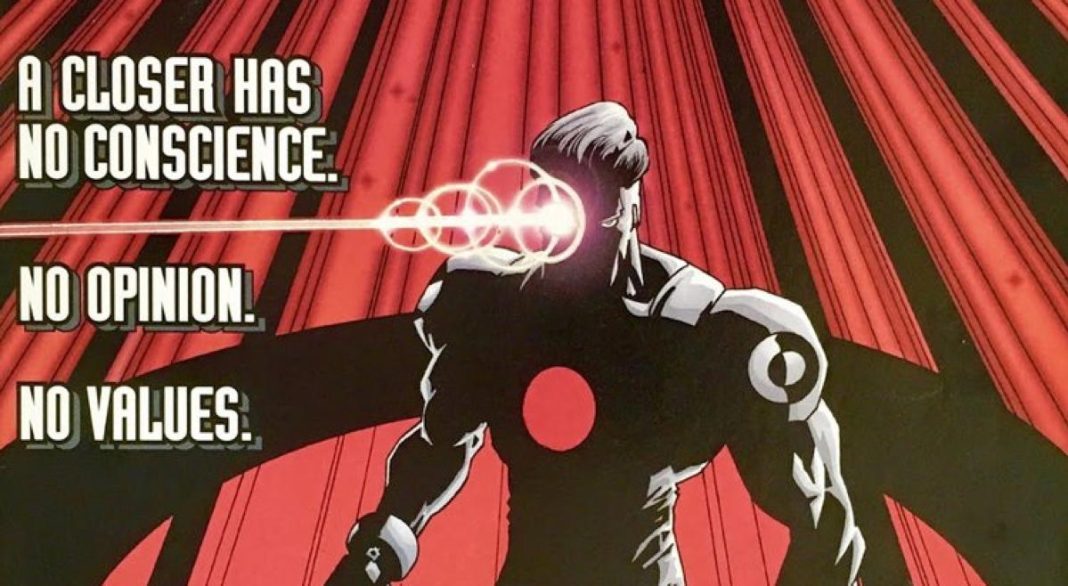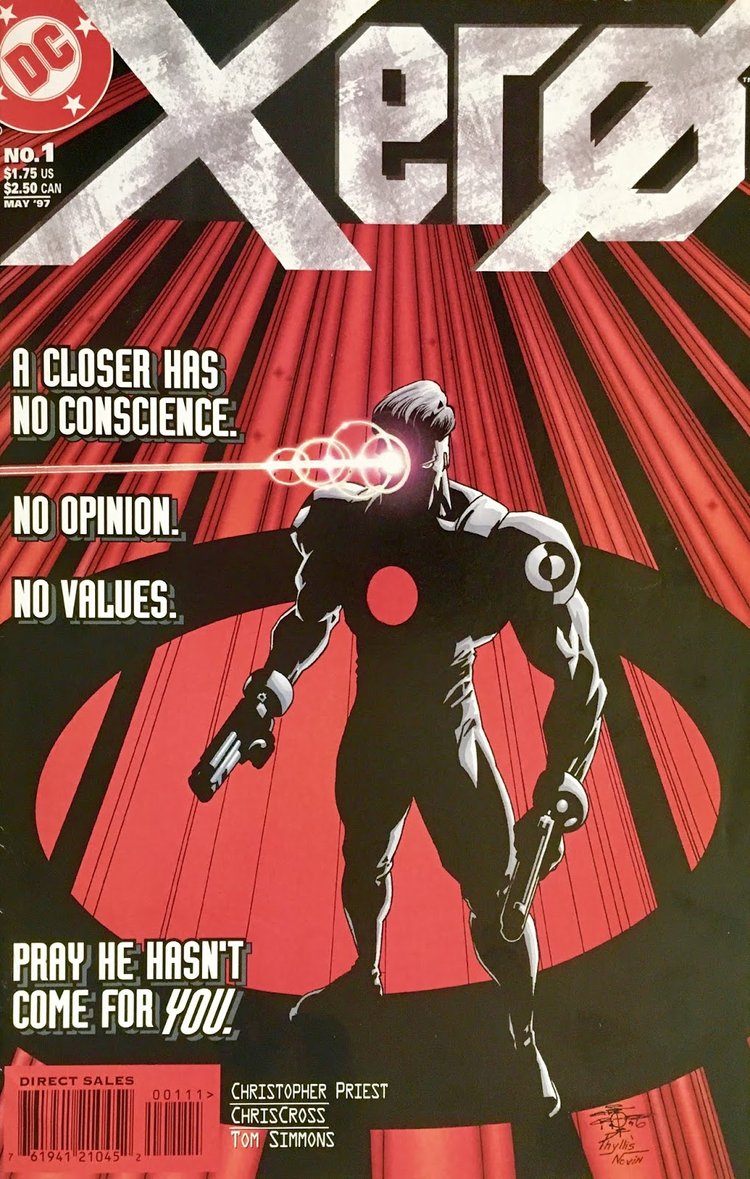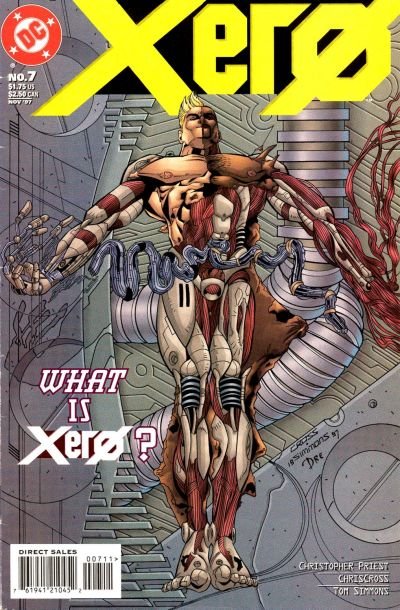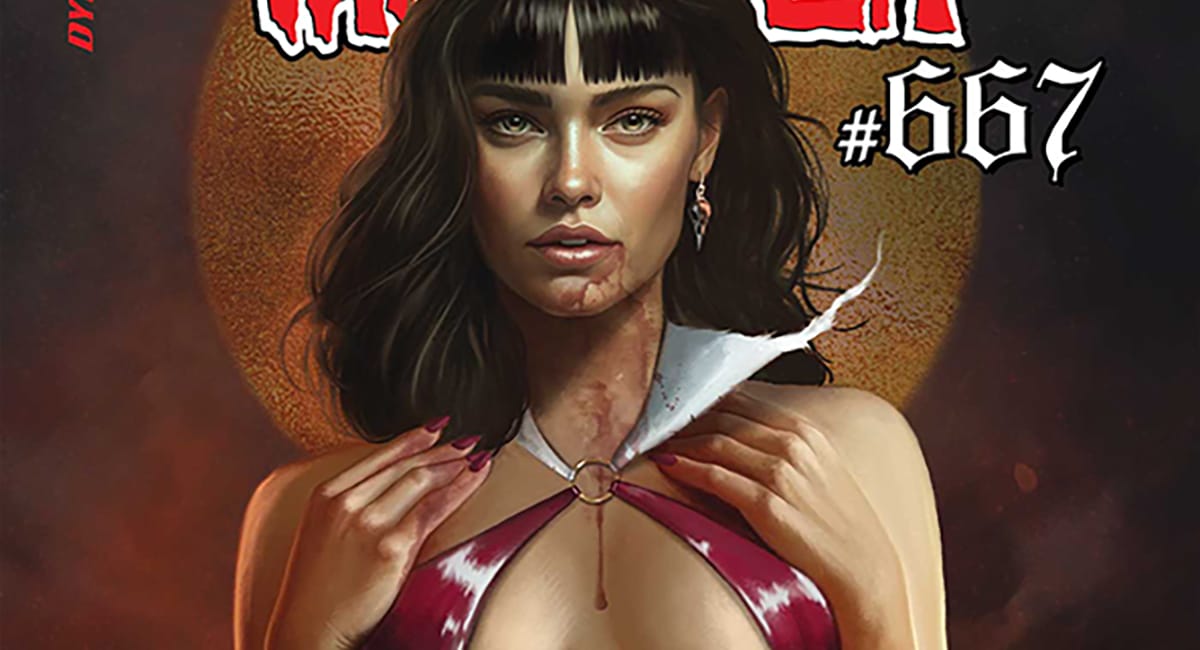Business is still booming for comics and new ventures are springing up all over the place. One such venture is Illuminous, a new production company launched by industry veteran Joseph P. Illidge. Illuminous made its industry trade debut last month with the announcement of a deal for Xerø, a 90s comic by Christopher Priest and artist ChrisCross. The property has been optioned by Curtis “50 Cent” Jackson’s production company G-Unit for development as a film franchise, with Color Farm Media, another production company run by Erika Alexander and Ben Arnon, also involved.
Xerø ran only a few issues starting in 1997 – maybe because its premise, then as now, is pretty startling: a Black government assassin disguises himself as a white man in order to carry out kills among the exotic Casino Royale haunts of the international elite.
Illidge has a long track record in comics, from working at DC Comics back in the day, to his current role as executive editor at Heavy Metal. He’s also written multiple comics projects, including MPLS Sound, about an ’80s Minneapolis funk group competing to become the next band for legendary musician Prince. He certainly has seen, if not all, then most of it. Along the way he’s become an unflinching commentator on race in and outside comics – a viewpoint that very much informs what he hopes to accomplish with Illuminous.
[This interview has been edited for clarity and length.]
The Beat: So I definitely want to talk about the project you’ve announced, Xerø with 50 Cent. But just let’s talk about starting a production company – how long you’ve wanted to do this, and how you went about doing it?

The Beat: True. March 2020, changed everything. I mean, whatever ideas you had going in about setting up this company, undoubtedly have evolved and changed. And we live in a very different world now.
Illidge: I’ll tell you one of the things that was definitely informed by the pandemic: it really made clear the financial nature of the comic book industry, as it relates to its creators, and just how many are surviving precariously, either through their own income and efforts, God bless them, or because they have a situation where they have a spouse with a 9-to-5 job with medical and dental benefits and a 401k, who is a supportive partner allowing them to evolve in their career.
Another conversation that’s been taking place in entertainment in general, is creator equity, profit participation, the relationships between companies and creators. You have various companies that have done right by their creators, creators that have developed IP that they have broadcasted and disseminated in various media throughout the world. You have other organizations that have not been exemplary in that regard. So one of the things that Illuminous is going to do is examine the profit participation model, and innovate on that, so that creators who develop intellectual properties with us can rest assured that they will have proper equity, proper profit participation, and that this will be a standard for the company.
The Beat: So let’s back up just a little bit for those who might not know. What is Illuminous? What does a production company do?
Illidge: It is a production company that is developing and creating properties for film, television, video games, various media. And Xerø is a prototype project for the company, because Xerø is going to be a film franchise that originated as a comic book. It really represents the bridge between the entirety of my career and going forward into media that is more extensive, reaches a larger audience, and presents more profit for creators. So the kind of partnership that was developed with Christopher Priest, the creator and sole owner of Xerø, and Color Farm Media, which is Erika Alexander and Ben Arnon, and 50 Cent, via his G-Unit film and television empire. Those are the kinds of future projects that we will be setting up. You look at something like Xerø, which was this gem that was forgotten by comic book history and also way ahead of its time. It came out in 1997. We talk about the pandemic in 2020, but obviously, something else happened in 2020, the terrible murder of George Floyd. The activism that came from that led to a real change in direction for the global entertainment complex, and the desire to seek out and embrace creators of color, their stories, and their visions, and seeing that extend across all the popular media empires. While Xerø was ahead of its time in 1997, it is right on time now. And so it was about finding the right partner to galvanize the project and take it to the film franchise stage. That’s where 50 Cent came in.
The Beat: Before we get to that part, can we talk a little bit about the story of Xerø at DC Comics? Because when you were talking earlier about companies that treat creators right, and so on, I think it would be surprising to some people that a superhero project that was published at DC [could revert to the creator.]
Illidge: Absolutely. Xerø was part of the DC Superhero universe and Christopher Priest had a unique contract that allowed him to retain ownership when Xerø was being published. Christopher and DC Comics shared the copyright and in a kind of arrangement similar to the Watchmen deal – if DC Comics chose to not publish or reprint Xerø after a certain amount of time, the publishing rights would revert to the creator, Christopher. They did not, which is the exact opposite of Watchmen where they fully intend to print Watchmen into perpetuity.
The Beat: I don’t mean to defend DC with their Watchmen deal because their dealings with Alan Moore over the years have not been a role model for anybody but when that deal was made, the idea of keeping a comic book in print for 40 years seemed ludicrous. And, of course, it was one of the books that would prove that it was a very viable option. It’s interesting to me that this kind of contract survived into the 90s at DC. And I mean, I don’t imagine it’s around now. I can’t imagine that a major media company like DC, which is owned by Warner Brothers, or Marvel, which is owned by Disney, would have a contract with reversion built in. [Note: creators can and have negotiated to get the rights back to comics published by DC even in recent years.] But at the time, it seemed viable.
Illidge: I’ll defend DC in this way. When you talk about creators receiving monies for characters that they have developed for the comic books, DC Comics, Warner Brothers is exemplary [with their royalty accounting].
But as far Watchmen goes, you have to remember that was the time of Paul Levitz, someone who was both a servant of the company and someone who understood that when creators get reciprocity, that inspires them to create more for the company. And Warner Brothers, DC’s reciprocity, in this regard [paying royalties], speaks to how they have continued to bring on new creators who are open to expanding their mythologies. What’s really interesting about the Venn diagram of Watchmen and Xerø is that HBO’s Watchmen series really helped lay the groundwork for the Xerø project, because it was that series that surprisingly engaged Blackness with such honesty and transparency, and showed that you could have a successful, critically acclaimed, highest quality show with global appeal that centers around Blackness.

The Beat: It’s interesting that Christopher Priest, who is one of the really protean creators in comics and very underrated, was able to get the rights back to it per the contract, cuz, obviously, DC at that point, didn’t think that there was any potential in this project. It was laying in the back corner, under somebody’s filing cabinet, basically.
Illidge: 100%. Whatever their method for assessment of Xerø’s value was, the fact that it was never collected into a trade paperback, the fact that it was never reprinted in any form whatsoever, clearly showed the level of corporate interest.
The Beat: Did you work on the original book when you were at DC?
Illidge: I did not – my only relationship to the original book is that I was a big fan. Other than that, my other connection is that Christopher and I are good friends. I have a career because of his work, founding Milestone Media. You’re right, he is one of the seminal editorial and writing voices of this era of the comic book industry. Part of the mission that was instilled in me by the Milestone founders, to elevate voices, goes to the voices of our veteran [creators] as well. So Xerø is something that has been on my radar for a number of years. When Color Farm and I developed the partnership to find projects and elevate them to a larger space, Xerø was the first project that came to mind.
The Beat: But this deal still took two years. I think that’s what people don’t get about the whole Hollywood process. I have a friend who shall remain nameless, who works for a comic book company as their media rep. He told me once, “You’ve got to remember, this is really, really hard. Getting people to put up the millions of dollars to make a movie or TV show is really hard. And it takes forever.”

Illidge: Part of the problem is that social media has distorted our perception of time and reality. So when people see announcements, they believe that those announcements involve endeavors that just add water, instant deal. Erika and Ben from Color Farm, Christopher and myself had a number of meetings with various luminaries in film and television. And it was a matter of finding the right partner, and Xerø, even in 2022, It’s definitely controversial. You’re talking about the story of a man who’s a black basketball player, whose secret identity is to dress up in state of the art prosthetics to disguise himself as a Caucasian blond man with blue eyes and go to anywhere in the world and kill anyone that the American government wants, and then go back home to St. Louis and play some more B-ball. That concept will still scare some people.
So the partner to take this on to the next stage had to be an fearless individual, and an individual that is ready to engage the streets, as well as the ivory towers of Dubai. And that is Curtis “50 Cent” Jackson. He walks in both worlds – Power was a huge success for Starz. The way he’s stretched out his Power universe, it actually replicates comic books’ spin off language, where you start with one show, and then you break out into these spin offs which follow different characters. They go to the future, they go to the past. His holistic understanding of world building really complemented the expansive vision of Xerø.
The Beat You mentioned Color Farm, which is another production company and it’s Erika Alexander, who also has comics in her background.
Illidge: That’s right. Erika Alexander, well known actress, producer, activist. You can see her on Wu-Tang: An American Saga on Hulu. She was in Get Out. Obviously, she’s a legend from Living Single. She and her partner Ben Arnon founded Color Farm Media, which is about elevating voices and stories from diverse communities in fiction and nonfiction. One of the significant projects they worked on was the John Lewis documentary Good Trouble. And she co-created the comic Concrete Park with screenwriter/artist Tony Puryear, which was published by Dark Horse. They co-created Concrete Park because when they had meetings with people in Hollywood, and they were being told that black people don’t like science fiction. Now, we all know that that assertion is erroneous and again, has been totally destroyed by the billion plus dollar success of Black Panther film.
The Beat: Can I just—wait, I just want to stop there. Because that is one of the dumbest ideas I’ve ever heard in my life. I mean, what is Get Out, what is Us. They both obviously have a lot to say about society and racism, but they’re also science fiction. And you and I both know about Afro-futurism, a movement which has been around for decades. These stereotypes which are based on sheer racism are just so frustrating.
Illidge: They’re based in racism, and financial control. They’re based on maintenance of generational wealth paradigms. They’re based in a number of things that are all interconnected and go back to the transatlantic slave trade. But we are now at a point where that is no longer the narrative, and while there are still more miles to walk, you are now seeing more black stories in popular entertainment than ever before, I believe. And that extends to comic books, of course.
The Beat: These ideas are so limiting and just leave money on the table. I remember hearing Ashley Eckstein talk about how she pitched Star Wars clothing for women a long time ago and she was told “Oh, women don’t like Star Wars, they won’t buy Star Wars merchandise.” Obviously, this was 15 years ago, but now selling nerdy clothing to women is a huge business. These ideas are just so dumb – in addition to the personal toll, they’re based on racism and sexism, and they cut off profits.

Part of what Illuminous is about is the long game, the idea that creators and their stories can now see new light. They were created ahead of their time and by ahead of their time, I mean, they were created in a climate that was not welcome to them or their stories. And now we have a climate that is welcome to both. When you think about a number of companies, you look at them and you see, short term capitalistic opportunism. You see companies that are designed with a short term goal. And this company is designed with a long term goal, the same way that the Milestone founders did. They didn’t create the company to last four years or 10 years, they created the company to have a multi generational impact, which it is now having. Through creating the Static comic books that led to the Static Shock cartoon, which was the pebble in the pond that changed global media, affected lives and reached more people. You can take the success of Sony’s Spider Man: Into the Spider-Verse, and trace it back to Milestone, because Brian Michael Bendis has gone on record saying that Miles Morales, a character he co created, was inspired by Static. So understand that every success and impression that has been made through Into the Spider-Verse, you can trace back to Milestone and a group of people who created something to outlast them. And tragically, it did outlast one of them, Dwayne McDuffie.
But this is what he wanted. This was the dream, and what’s happening now with the company. That is what we need going forward, these kinds of companies, and this kind of reciprocity for the creators that fuel these companies.
The Beat: What else is Illuminous up to, what else are you doing? Will you be involved with publishing at all?
Illidge: We are in the process of setting up new projects, like Xerø, that will find life in the film and television and video game space, whether through live action or animation. So the same way that Xerø was happening for two years, and I did not speak about it, there are other projects happening, and I will not speak about those.
Secondly, Illuminous is developing new intellectual properties. So we are in discussions with various creators and agencies about bringing them on as partners for equal ownership in these intellectual properties. Insofar as publishing goes, they will see the first form as publishing. Illuminous will identify print partners that will extend the stories – with a debut in the digital space and the second stage in the print space. So interestingly enough, it will be a deal that has similarities to the Milestone/DC Comics original arrangement, or the deal that Roye Okupe has via Youneek Studios and Dark Horse, where the company will control and own the content, and the publisher will handle publishing distribution and marketing.
The Beat: Very cool. Anything else that we need to know before we wrap this up?
Illidge: Xerø is in the works, which we’re really excited about. And very soon we will be talking about members of the board of directors and a new profit participation model.












I genuinely though I was the only person who remembered Xero. Great stuff. Congratulations to everyone involved!
Comments are closed.